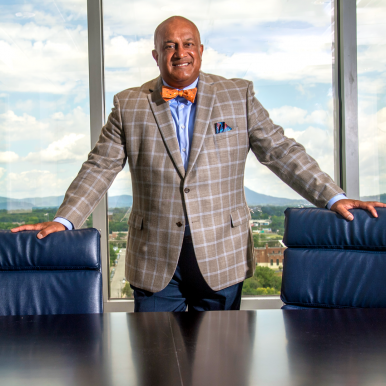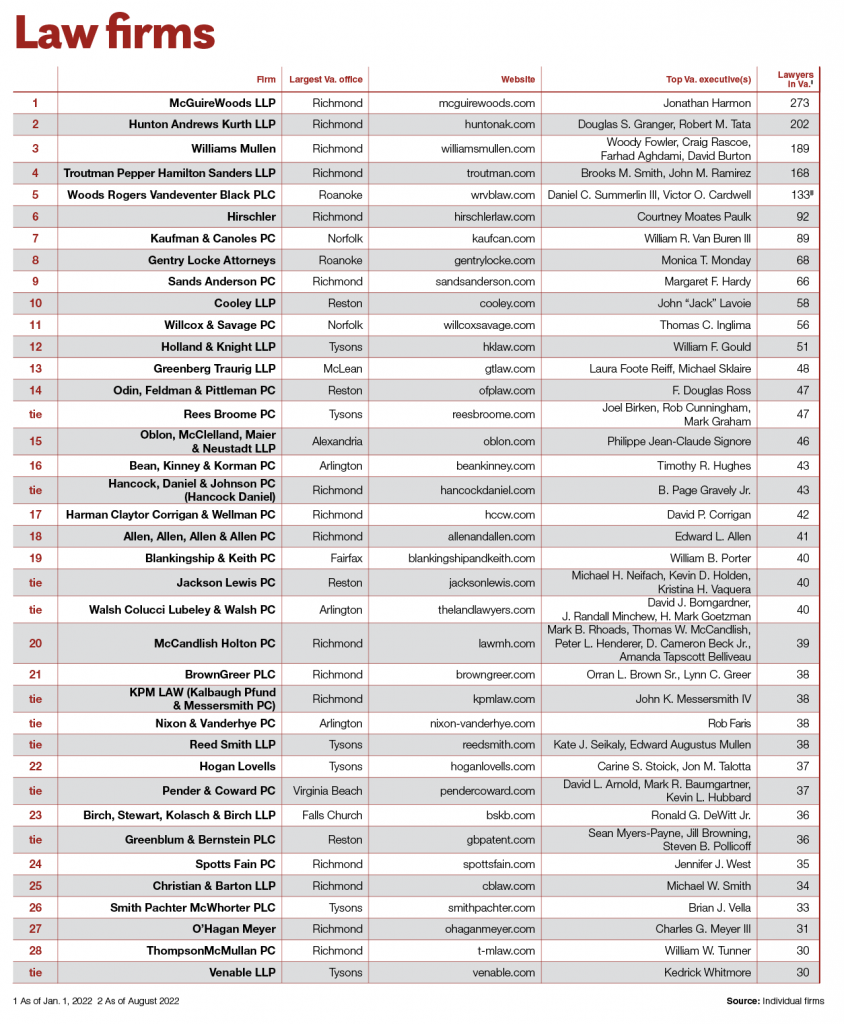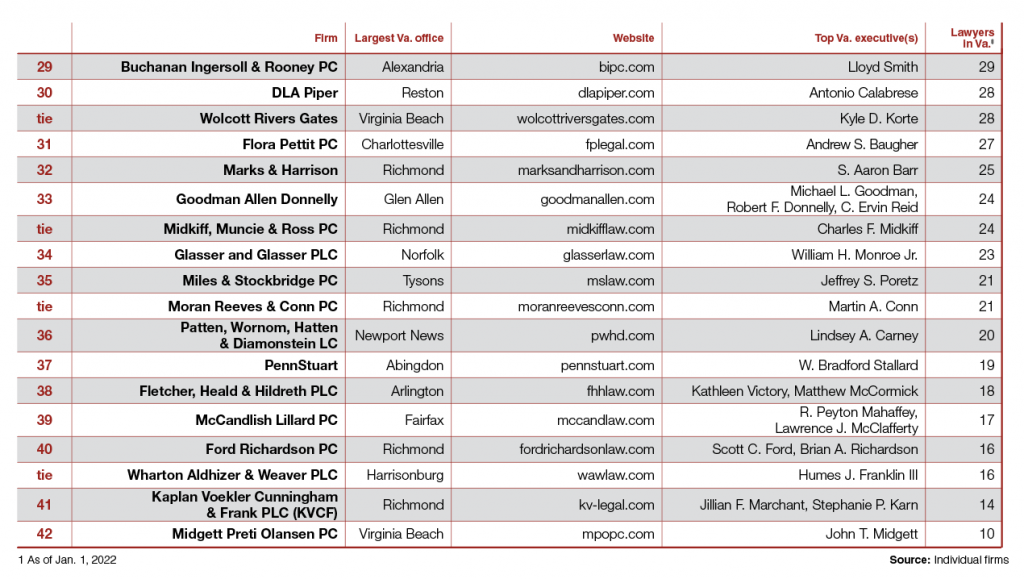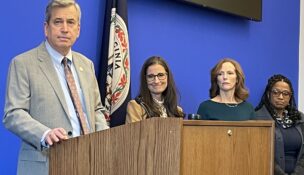Hitting home
Firm leaders contend with remote work demand
“The stereotypical view is that every young lawyer wants to work from home,” unlike their older peers, observes Victor O. Cardwell, principal and chairman of Roanoke-based Woods Rogers Vandeventer Black PLC.
Indeed, 51% of baby boomer attorneys report being eager or very eager to get back to the office, but just 22% of their millennial colleagues agree with them, according to the results of a Return to Office survey published in May by Law360 Pulse and legal executive search firm Major, Lindsey & Africa.
The reality, Cardwell finds, has been more complex.
At his firm, he says, he sees both senior and younger attorneys embracing the idea of working remotely — at least part of the time.
“Everybody wants flexibility,” Cardwell says. Firms looking to recruit good talent — and that would be most firms in the current tight labor market — need to keep in mind that “flexibility is one of the selling points.” That usually means a hybrid schedule, alternating in-office and remote work.
And while younger attorneys may say they want to work remotely, Cardwell says, “they went into law to work with people. … They want to be around other lawyers for the training opportunities.”
Callaghan S. Guy, an associate practicing in commercial real estate, environmental and health care law at Richmond-based Christian & Barton LLP, says that in her experience, there may not be as much of a generational divide when it comes to remote work. “I hear younger workers talking more about wanting to work from home. Younger workers are talking more about it. Older workers do it.”
Guy started at Christian & Barton in 2018 after graduating from the University of Richmond. The “default” position at Christian & Barton is working from the office, she says, but the firm has “fairly flexible” arrangements about working remotely.
In general, she says, “if people say they don’t want to come into the office, maybe that’s a problem with the office. You need to create the office you want to be in. If law firms want people to come into the office, there have to be benefits, there has to be good mentorship,” she says.
Steven D. Brown, a partner in Isler Dare PC’s Richmond office, believes that younger attorneys see the value of collaboration and contact with senior partners.
“They want that interaction,” says Brown, who also serves on the Virginia Bar Association’s board of governors. But, he adds, “it doesn’t make sense to mandate” the amount of in-office time required of attorneys.
Isler Dare, a boutique firm with 17 lawyers across offices in Tysons, Richmond and Atlanta, had experience with attorneys working remotely even before the pandemic shutdowns. Now, Brown says, “most of our folks are in the office part of the time,” working a hybrid schedule. Successful hybrid work experiences don’t depend on the size of the firm, though, Brown says. “It depends on whether the management team is willing.”

Generation Remote?
If firm leaders aren’t willing to make some accommodations when dealing with younger workers, that won’t go over well and could result in losing talent, he adds. “Gen X and Gen Y require you to modify who you are as a leader. They look at things differently than we do,” and communicate differently, says Brown, a self-described baby boomer. “That’s OK.”
Monica Monday, managing partner at Gentry Locke in Roanoke, reports that younger attorneys with less experience have been finding remote work “a significant challenge.”
It benefits younger attorneys to work in person so that “they can walk down the hall to the partner’s office and ask questions,” according to Monday. “It allows them to get professional development at the pace that they want it. Less experienced attorneys want that development and so much of that comes from partners, from working with teams.
“It’s important for firms to create a culture that values relationships,” she continues, “both with each other and with clients. That’s the glue that holds us together.”
Monday has talked with colleagues at other firms who are struggling to bring people back into the office.
“I have heard from bigger firms in bigger cities that attorneys young and old don’t want to come back. In urban areas I think it is a different dynamic,” she says, because of traffic battles and parking restrictions. But in Roanoke, where Monday works, “people have a 10-minute drive to work. If I were in an urban area, I would want to come into the office a couple of days a week, but you couldn’t pay me to come in full time. It’s not an efficient use of my time.”
At Pender & Coward PC in Virginia Beach, “it’s expected that people come into the office, but it’s not such a hard rule,” says shareholder Kristen R. Jurjevich, who has been an attorney for more than 10 years and whose practice areas include corporate and transactional law, real estate, community association matters and litigation.
“Sometimes I choose to go into the office. I really enjoy the people I work with,” says Jurjevich, adding that she appreciates a culture where some attorneys at the firm go to lunch together every day just because they enjoy each other’s company.
“I’m happy with the flexibility,” she says, but “if they said it was mandatory [to be in the office], I would have an issue.”
Jurjevich has a 2-year-old daughter, and her husband, who is not an attorney, has a job that isn’t as flexible about working outside his office.
Finding child care has always been difficult, but the pandemic has made it worse, she says. “That’s a factor. Things happen. Flexibility is key.”

In the loop
Keeping people who are working remotely in the loop is critical to the success of the hybrid work model, according to Brown. “We have to make sure we’re giving them the same thing. People shouldn’t suffer because they’re not in the office. People working remotely have to stay top of mind.”
That requires clear expectations and communications, he says. “For remote folks, we make sure we dial them in. We really schedule specific times” for interaction.
Using collaboration and work management software to assign tasks, track project progress, share documents and calendars, and manage other work is valuable because “it allows everybody to track and to make edits in real time. It keeps detailed status reports. It keeps folks plugged in.”
Woods Rogers Vandeventer Black has no formal mandate regarding in-office or remote work, but Cardwell believes it’s important to have senior attorneys in the office at the same time as their younger counterparts. He suggests there may be a need for some type of “core hours” when people are expected to work in the office, but he adds, “I’m not going to draw a line in the sand. COVID taught us we have to be flexible.”
Gentry Locke’s attorneys worked fully remote for just 13 weeks during 2020 because “we had associates and partners who did not like being at home and being disconnected,” Monday says. Firm leaders quickly realized “that without in-person collaboration, there was something really missing. We made a conscious decision to return. We learned that remote work and flexibility’s here to stay but you need to find the balance.”
Working remotely requires more initiative on the part of both the individual and the firm, Monday says. Attorneys who generally work remotely need to tell co-workers when they plan to be in the office, so everyone can maximize opportunities for interaction. And law firms should build team camaraderie through activities such as social hours, agenda-less monthly lunches and group roundtables, suggests Monday.
Gentry Locke has developed a more in-depth orientation program and encourages remote workers to attend key meetings in person. The firm also has its own training program, known as “Gentry Locke University,” where “we talk about the culture, about professionalism, about policies. This is where we talk about the importance of relationships, how to grow relationships, how to work with clients,” she says. “We talk about the importance of community, about bar activities and we have programs on networking and business etiquette. We try to cover all the bases.”
One thing Monday does see changing due to the pandemic’s upheaval is the dress code at law firms. “I think across the country we’re seeing more business casual. You dress for your day — are you meeting with clients, are you going to court?”
Gentry Locke generally maintains a business casual dress code in the office, she adds, allowing workers to wear jeans on Fridays if they contribute to charitable fundraisers.
When attorneys started going back to the office at Christian & Barton, casual dress was the rule rather than the exception, Guy says, but attire has been returning to pre-pandemic standards. Now, “we’re not wearing jeans in the office or anything.”
At Pender & Coward, “on average people are more often business casual unless they are going to court,” says Jurjevich. “But some people say if they dress up, they are most alert. As they say in law school: Dress to get things done.”
Battling burnout
One big concern now, Cardwell says, is how to help firm members find work/life balance and avoid burnout.
“The pandemic has shown how fragile our work lives can be,” Cardwell says. “One of the hard parts is that we don’t check out. The work environment has relocated, has gone with us. We don’t turn off — our devices or ourselves.”
Eighty-six percent of employees who work from home full time say they experience burnout, while 81% of hybrid workers and 70% of in-person workers say the same, according to career planning site Zippia. Sixty-seven percent of remote workers report feeling pressured to be available all the time, according to Zippia, and 51% feel they don’t have support from their employer to deal with burnout issues.
Burnout can hit young lawyers hard. They often are driven, Cardwell says, and “we have to try to convince them this is truly a marathon. We, as the firm, are not looking for them to burn candles at both ends and the middle. Sometimes we can see that, and we pull them aside and talk.”
To help avoid burnout, Cardwell suggests firms consider policies that restrict contacting subordinates after hours. “As senior lawyers, we have to be cognizant of sending out emails about jobs, assignments [or] queries to people who are going to feel they are responsible to respond,” he says.
Brown believes that the younger generation of attorneys has been doing a better job than older attorneys of avoiding burnout while working remotely. Younger lawyers “do a much better job of compartmentalizing, of keeping things separate,” he says. “When they’re gone, they’re gone. They are able to unplug. They take their time off when they’re given it. They don’t check in; they trust others” to keep them in the loop.
But “it’s harder for me,” adds Brown. “I’ve learned from Gen X and Gen Y about how they are able to do that.”
-




















